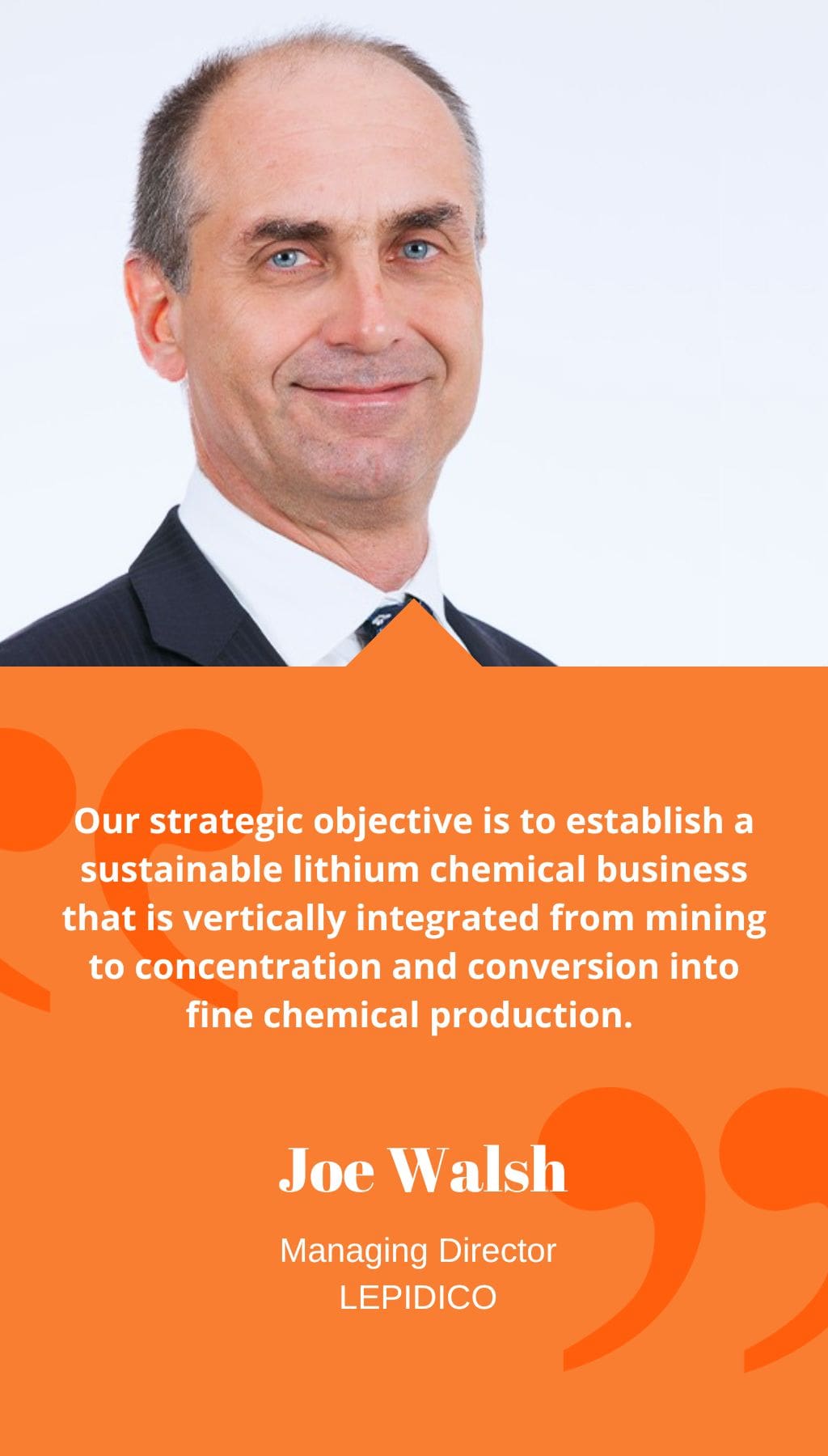
- South Africa | 27 April 2019

Can you provide an overview of Lepidico?
Certainly. Lepidico is a lithium development company that has been listed on the ASX (LPD) since 2016. We are focused on becoming a preferred supplier of sustainable lithium chemicals and other strategic alkali metal compounds globally. What sets us apart is our proprietary technologies, which position us as leaders in the industry. Our unique processes allow us to produce high-purity lithium chemicals suitable for battery applications from lithium mica and lithium phosphate minerals. Our strategic objective is to commercialize these technologies, which we have been developing for the past eight years, in order to provide the chemical industry with alternative sources of hard rock lithium.
Could you provide more details about the Karibib project in Namibia and its significance for Lepidico?
The Karibib project in Namibia has historically been mined for tantalite and petalite found in pegmatite deposits. However, there are still significant quantities of lepidolite, a lithium-containing mineral, both in-situ and in surface stockpiles. These resources serve as the mineral feed for Lepidico’s Phase 1 project, which is a vertically integrated development. It includes a flotation plant at Karibib that will produce a mineral concentrate. This concentrate will be further processed at a new chemical plant in Abu Dhabi, utilizing our proprietary process technologies. This project presents a unique opportunity for the production of lithium, caesium, rubidium, and potassium, all of which are valuable and highly sought-after alkali metals listed among the US’ Critical Minerals.
Can you elaborate on Lepidico’s process technologies and their advantages?
Our main process technology is called L-Max, which enables us to extract lithium and other metals from lepidolite and produce high-purity chemical products. Another process technology we employ is LOH-Max, which allows us to convert lithium sulphate intermediate directly to lithium hydroxide without generating potentially problematic sodium sulphate, a by-product of conventional methods. These technologies provide several advantages, including efficient leaching of metals from lepidolite, high purity of chemical products, and a more streamlined and environmentally friendly production process.
Besides lithium, what other valuable metals can be derived from lepidolite, and how does Lepidico extract and utilize them?
Lepidolite contains significant concentrations of caesium, rubidium, and potassium, in addition to lithium. Our L-Max process enables the selective separation of these alkali metals, which serve as valuable by-products. Potassium, known as potash or SOP, is a premium fertilizer with a substantial market in the UAE region. Caesium and rubidium are particularly important as critical minerals. By incorporating our process technologies, we can extract and utilize these metals in a sustainable and efficient manner.
Has Lepidico made a final investment decision on Phase 1 of the Karibib project?
We completed a definitive feasibility study in May 2019. Since then, we have been focused on securing the necessary permits and approvals, finalizing product offtake agreements, and securing a full funding package. The project has received full permitting in Namibia, where we have obtained a mining license, water extraction permit, and environmental compliance certificate. In Abu Dhabi, the permitting process is nearing completion, and we are waiting to secure the full funding package before signing the land lease agreement. We have entered into a mandate agreement with the US Government’s International Development Finance Corporation (DFC) in October 2020, which provides funding for environmentally and socially responsible projects in developing countries. Currently, we are in the confirmatory due diligence phase with DFC for debt funding for the Namibian part of the project.
How would you describe Namibia as a mining investment destination?
Namibia is considered one of the top countries for mining in Sub-Saharan Africa. We have established excellent communication channels with the relevant government entities, and the mining industry is well-established in the country. Local communities in the region where we operate are familiar with mining activities, and through ongoing consultation, they are supportive of the development at Karibib. This support is essential for our license to operate. The infrastructure in the region is generally good, with only a 30 km power line spur needing to be built. Namibia is also rapidly evolving its power infrastructure and aims to generate around 80% of its power from renewable sources by 2025. Overall, Namibia provides a favorable environment for mining investments.
What are Lepidico’s strategy and objectives for the next two years?
Our strategic objective is to establish a sustainable lithium chemical business that is vertically integrated from mining to concentration and conversion into fine chemical production. We aim to demonstrate the commercial viability of our proprietary process technologies, L-Max and LOH-Max. Based on our definitive feasibility study, we anticipate producing approximately 5,000 tonnes of lithium hydroxide per year, along with valuable by-products. We are working towards making a final investment decision in the second half of 2021, allowing us to commence mining in Namibia in the second half of 2022. Following that, we plan to commission the flotation plant in late 2022 and the Abu Dhabi chemical plant in early 2023, leading to commercial production. Our project holds excellent environmental and social credentials, with low carbon intensity and water usage. Additionally, we aim to contribute to the rehabilitation of old mines in Namibia and provide significant economic benefits to the local communities by creating employment opportunities and indirect job creation in the region.














